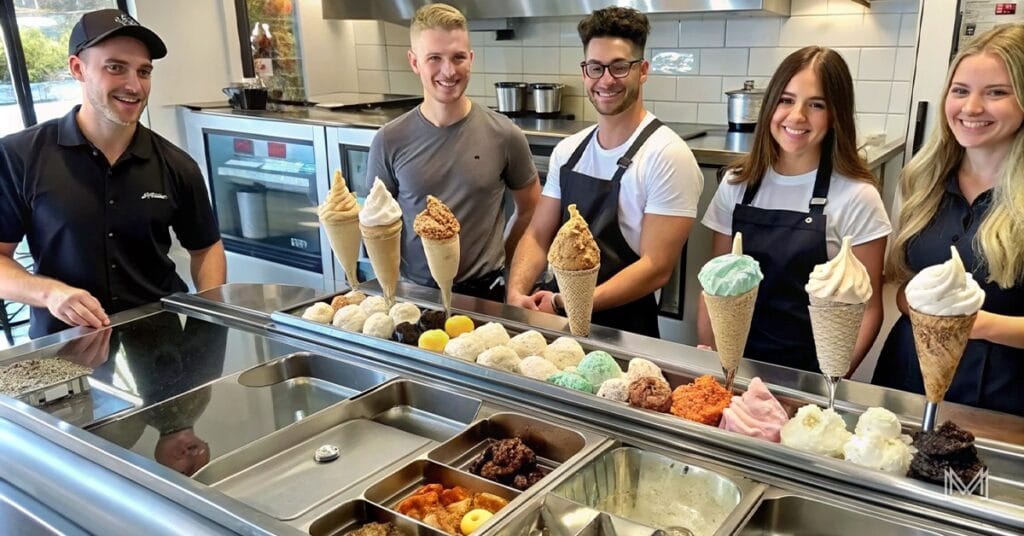Turn R20k into R100k in December with an Ice Cream Business
The December sun in Mzansi does not play. As the heat turns up, every person on the street is looking for a way to cool down. This creates a massive opportunity for anyone looking for small business ideas that can generate quick cash. If you have R20,000 saved up, you are sitting on a gold mine. You don’t need a fancy degree to understand that high demand plus a hot climate equals a winning formula for ice cream business. This is an easy business to start. You can see a high turnover in just thirty days.
Many young people ask what business they can start with limited capital during the holidays. The answer is simple: follow the crowds. Whether people are at the beach, the park, or a local taxi rank, they all want something sweet and cold. By focusing on a high-volume ice cream business, you can realistically aim for that R100,000 turnover mark. It requires discipline and a “hustle” spirit, but the math actually works in your favour.
Why December Is the Perfect Time for an Ice Cream Business
Timing is everything in entrepreneurship. December is the month of “Dezemba”, where spending increases and people are constantly outdoors. Thus, you are not just selling a product; you are selling a moment of relief from the scorching sun. When looking at the top 10 small business ideas, this one consistently ranks high. The profit margins on sugar and dairy are excellent. You can start small, but the potential to scale is almost immediate.

Furthermore, the festive season brings out a specific type of buyer. People are more relaxed with their money and looking to treat their children or themselves. Thus, your ice cream business becomes a magnet for foot traffic. Position yourself near a busy shopping centre or a local community event. You won’t even need to shout to get customers. They will find you. This is why many experts agree it is one of the best small business ideas for the South African context.
You are not just selling a product; in Dezemba, you are selling a moment of relief from the scorching sun.
What You Need to Get Started with Your Ice Cream Business
To hit that R100,000 goal, you need the right tools. Your R20,000 budget should be split between a reliable machine and your first stock. You can find a decent soft-serve machine or a high-quality display freezer within this price range if you shop around. Additionally, you should look for a Polar Ice Cream Factory shop price list PDF online to compare wholesale costs. This will help you keep your expenses low while keeping your quality high.
| Item Description | Estimated Cost (ZAR) | Purpose |
| Soft Serve Machine (Entry Level) | R14,500 | Main production unit |
| Initial Stock (Mix, Cones, Flakes) | R3,000 | First week of sales |
| Gas/Electricity & Transport | R1,500 | Operational costs |
| Marketing & Signage | R1,000 | Attracting customers |
| Total Investment | R20,000 | Total Startup Capital |

Ice Cream Machine Silver

Ice Cream Machine

SnoMaster -15Kg Counter-Top Ice-Maker Stainless Steel
Starting an ice cream business doesn’t mean you have to invent a new flavour from scratch. You can start by selling ice cream from established South African ice cream brands to build trust with your customers. Many successful vendors began by buying bulk from a Polar Ice Cream factory shop in Pretoria or other regional hubs. This lets you focus on the selling part of the job while the big brands handle the manufacturing side.
Sourcing Stock: From Local Brands to an Ice Cream Business Franchise
Where you get your stock determines your profit. If you are in Gauteng, visit Polar Ice Cream Mayfair. You can also check out Polar Ice Cream Centurion. Both are smart choices for bulk buying. For those further south, Polar Ice Cream Lottery is a legendary spot for wholesalers. Even in the Free State, you should visit Polar Ice Cream Bloemfontein. It can give you the inventory you need. This helps keep your freezers full. These factory shops offer prices that allow you to mark up your products significantly.

Moreover, you should keep an eye on the bigger industry moves. The Unilever ice cream business shows that the global market is shifting. The recent HUL ice cream business demerger shows this shift. It relates to the Hindustan Unilever demerger of the ice cream business. Even a mini ice cream business can benefit from understanding these trends. If you want to own an ice cream franchise in South Africa, you must know your suppliers. Staying independent also requires awareness of suppliers. Knowing your suppliers is key. You will even find inspiration from a Soweto creamery Jabulani menu to see what local customers are currently loving.
Mastering the Ice Cream Business Marketing Strategy
Your brand name is your handshake. You should brainstorm unique ice cream business names or ice cream business name ideas that resonate with your local community. Something like “Mzansi Melts” or “Kasi Cones” can go a long way. Once you have a name, get a professional ice cream business card and set up a TikTok or Instagram account. In today’s world, people eat with their eyes first. Thus, your marketing needs to look as good as your treats taste.
| Product | Base Price (R) | Factors Influencing Price | Example Price Range (R) |
|---|---|---|---|
| Single Scoop Cone | 4.50 | Ingredients, size, toppings | 4.50 – 7.50 |
| Double Scoop Cone | 7.50 | Ingredients, size, toppings | 7.50 – 10.00 |
| Sundae | 9.00 | Ingredients, toppings, size | 9.00 – 15.00 |
| Milkshake | 12.00 | Ingredients, size, toppings | 12.00 – 18.00 |
| Ice Cream Sandwich | 5.00 | Ingredients, size, toppings | 5.00 – 8.00 |
| Waffle Cone (Single Scoop) | 6.00 | Ingredients, size, toppings | 6.00 – 9.00 |
| Waffle Cone (Double Scoop) | 8.00 | Ingredients, size, toppings | 8.00 – 12.00 |
| Vegan/Dairy-Free Options | Slightly Higher | Specialty ingredients | 5.50 – 9.50 |
| Gourmet/Artisan Options | Higher | Premium ingredients, unique flavors | 7.50 – 15.00 |
Additionally, consider success stories like Thando Makhubu Ice Cream. Notice the famous ice cream place in Soweto to see how they used social media to grow. They didn’t just sell food; they sold an experience. You can use slogans for ice cream business success, like “The Coldest Treat in the Heat”, to grab attention. If you are wondering which business I can start that has viral potential, this is definitely it. A well-placed video of a “soft serve” swirl can bring in hundreds of customers from your local area.
Legal Steps to Formalise Your Ice Cream Business
You can’t ignore the paperwork if you want to grow. Even though you are starting small, having a business plan for ice cream success is vital. You can find an ice cream business plan PDF online. You can also find a business plan on an ice cream template online. These resources can help you structure your thoughts. This document is crucial. It is needed if you ever want to apply for a permit to trade at a specific beach or park. It also helps you track your goal of turning that R20k into R100k.

Furthermore, you need to think about health and safety. Local municipalities demand a Certificate of Acceptability when you are selling ice cream to the public. This ensures your equipment is clean and your food handling is up to standard. Whether you are running a soft-serve ice cream business or a mobile cart, being legal protects you from fines. It also makes your ice cream business look more professional to potential partners. Event organisers want to hire you for a private event.
Conclusion – Types of Business Ideas
To wrap it up, turning R20,000 into R100,000 is a challenge. But, it is entirely possible with the right ice cream business ideas. You have the heat, the demand, and the suppliers all ready for you in South Africa. Focus on high-traffic areas. Keep your costs low through bulk buying. This way, you can make this December your most profitable month yet. The “Dezemba” hustle is real, and the rewards are sweet for those willing to put in the work.
Timing is everything in entrepreneurship, and in South Africa, ‘Dezemba’ is the ultimate time to hustle.
Remember, every big brand started as a small business, starting in a garage or on a street corner. You be inspired by the ice cream Soweto scene. Maybe you want to create something entirely new. The opportunity is yours for the taking. So, are you ready to stop wondering what business ideas work and start building your own empire? The sun is out, the customers are waiting, and your future is melting away if you don’t take action now.
Frequently Asked Questions
How much capital do I need to start this ice cream business?
You need at least R20,000 to cover the cost of a reliable soft-serve machine and your first stock. This budget helps you launch quickly and start generating profit during the busy festive season.
What are the best locations to set up my ice cream stand?
Focus on high-foot-traffic areas like local beaches, busy taxi ranks, or community parks during the December holidays. Positioning yourself where crowds gather to escape the heat will guarantee a steady stream of thirsty customers.
Where can I source affordable ice cream stock in bulk?
You should visit local suppliers like Polar Ice Cream factory shops in Durban, Mayfair, Centurion, or Bloemfontein for wholesale prices. Buying in bulk ensures your profit margins stay high while keeping your freezers fully stocked for customers.
Do I need any legal permits to sell ice cream in South Africa?
Yes, you must obtain a Certificate of Acceptability from your local municipality to guarantee you meet health and safety standards. Having the correct paperwork also protects your business from fines and helps you secure spots at organised events.
How can I market my new ice cream business effectively?
You should create a catchy name and use social media platforms like TikTok or Instagram to showcase your treats. Professional business cards and high-quality photos of your products will help build trust and attract local customers quickly.


